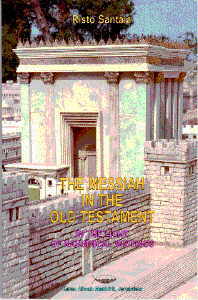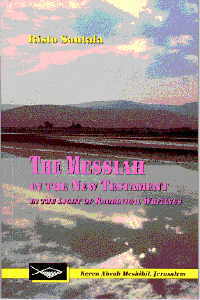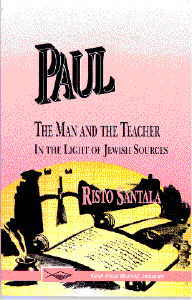THE MESSIAH
IN THE
OLD TESTAMENT
IN THE LIGHT OF RABBINICAL
WRITINGS

THE MESSIAHIN THEOLD TESTAMENTIN THE LIGHT OF RABBINICALWRITINGS |
 |
This book about the Messianic Old Testament prophecies in the Light of Rabbinical Writings has already seen eight Hebrew editions in Israel. It is the first study written in modern Hebrew by a gentile scholar. According to the writer he is making a kind of "Nahson's leap", the first one to jump into the Red Sea at Moses' command. The item is somewhat delicate. The writer is stepping into the lion's den of the Rabbis and into the fiery furnace of the liberal theologians. But he hopes that others will follow him and promote a similar dialogue in the spirit of tolerance and spiritual democracy. The book has been translated e.g. in English, German, Russian, Finnish and Estonian. The Chinese version is forthcoming also.
A certain prominent Arameic scholar wrote to the author
saying that according to his estimation "no such material
concerning the identity of our Lord has hitherto been condensed
into such a succinct presentation as this"
| You can read the whole book by
clicking here: The Messiah in the Old Testament (in English) EL MESÍAS EN EL ANTIGUO TESTAMENT (in Spanish) המשיח בתנ"ך לאור ספרי חז"ל (in Hebrew) Мессия в Ветхом заветев свете раввинистических писаний (in Russian) 舊約中的彌賽亞-拉比文獻的印證 The Messiah in the Old Testament (in Chinese) |
If you want to buy a printed version of this book
in English
or in Hebrew,
you can see instructions here. |
THE MESSIAHIN THENEW TESTAMENTIN THE LIGHT OF RABBINICALWRITINGS |
 |
The originals of these studies written in modern Hebrew have seen
in Israel already several editions. According to the estimation of
a prominent Aramaic scholar "no such material concerning the
identity of our Lord has hitherto been condensed into such a
succinct presentation as this."
| You can read the whole book by
clicking here: The Messiah in the New Testament (in English) EL MESÍAS EN EL NUEVOTESTAMENTO (in Spanish) המשיח בברית החדשה לאור ספרי חז"ל (in Hebrew) Мессия в Новом заветев свете раввинистических писаний (in Russian) |
If you want to buy a printed version of this book
in English
or in Hebrew,
you can see instructions here. |
PAULTHE MANAND THE TEACHERCopyright © 1995 Risto Santala |
 |
Paul - the Man and the Teacher describes the course of the apostle’s life, the influences he received in his childhood, his education at the feet of Gamaliel, and his inner crisis as the opponent of Christianity when he became the Apostle to the Gentiles. From hundreds of little scraps of information there emerges a close-up picture of Paul’s psychology and the foundations of his thinking. The Christian reader can agree with the final conclusion reached by Rabbi Gottlieb Klein: "Thus Paul drew conclusions from his faith. He broke down the fence erected between Israel and the Gentiles. God-fearing Gentiles no longer belong to a secondary system as semi-proselytes and, as it were, an appendage of Judaism. In Christ all are equal -- the bond to Israel must not be severed. No, it should be tied more strongly!"
"When the Jews return to the land of their fathers, they will
return along a bridge of papyrus," says an ancient proverb. In
this way they will return home to their roots. As Christians, we
too need to return to the birthplace of our faith. This book on
Paul is intended as a continuation to the books "The Messiah in
the Old Testament in the Light of Rabbinic Literature" and "The
Messiah in the New Testament in the Light of Rabbinic Literature,"
by Risto Santala.
| You can read the whole book by clicking here: Paul - the Man and the Teacher (in English) PABLO EL HOMBRE Y EL MAESTRO (in Spanish) Апостол Павел, человек и учитель в свете иудейских источников (in Russian) |
If you want to buy a printed
version of this book in English or in Hebrew,
you can see instructions here. |
THE MIDRASHOF THEThe Messiah and His Mealin Midrash Ruth Chapters V, VII and VIII |
 |
Our author Risto Santala found Midrash Ruth while preparing his two main Hebrew books about the Messiah in the Old and New Testaments in the Light of Rabbinical Writings. Midrash Ruth reveals an eternal perspective on the Messianic banquet similar to the Holy Communion in the New Testament. The concepts as "to eat in this world, and in the Messianic age, and in the World to Come", "the bread of the kingdom", the Messiah, who "was wounded for our transgressions", the Messiah who will "rain down manna" upon his people, the discussion concerning Elijah recording our good deeds and "the Messiah and the Holy One subscribing and sealing them" provided imposing spectacles for studying other Rabbinical writings.
| You can read the whole book by
clicking here: The Midrash of the Messiah (in English) МИ РАШ О МЕССИИ (in Russian) |
If you want to buy a
printed version of this book in English,
you can see instructions here. |
| Publisher of these books in Hebrew and in English: | The writer of these books: Risto Santala |
Mail address: Keren Ahvah Meshihit P. O. Box 10382 91103 Jerusalem Israel |